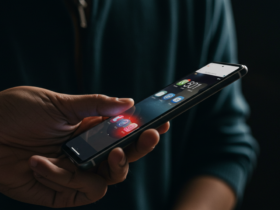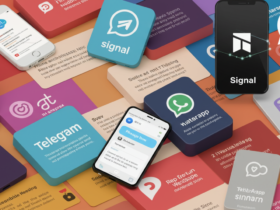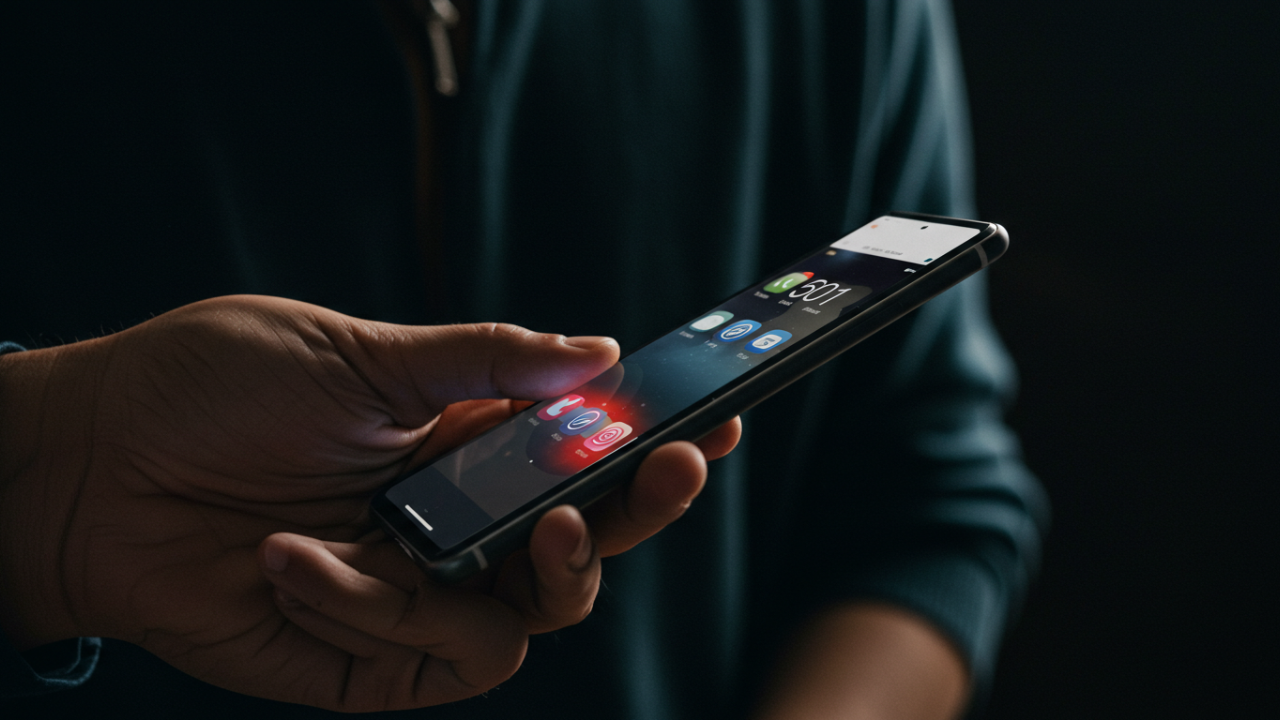Intro of How to know if your phone is hacked (warning signs)
Have you observed anything odd on your phone? Your battery life might decrease in a matter of hours or hours, or apps might begin opening on their own. You might start asking yourself: Has my phone been hacked? In this digital era, smartphones are common devices owned by many individuals.
This poses a risk to hackers as they contain a wealth of personal data such as photos, emails and bank account details. If a malicious individual gets hold of such data, it can lead to serious repercussions.
In this article, I intend to make you aware of possible signs that your phone could be tampered with. I will also share a few tips that can significantly heighten the security of your device. At the end of the article, you will have sufficient knowledge to mitigate any risks to your sensitive data.
How Do Phones Get Hacked? (Understanding the Risk)
Before discussing the red flags, allow me introduce the process of how a hacker is able to gain access to your phone. Phones can get hacked using a variety of methods. Familiarizing yourself with these techniques would be beneficial in knowing what to keep an eye out for.
Phishing Attacks (The Sneaky Approach)
Phishing is perhaps one of the easiest methods that hackers use to obtain personal information. They can do this via SMS (smishing), emails or even fake websites. You might receive links for “special offers” or some critical offers seeking login information.
How it Works:
They pose as well-known institutions, for example, your bank or famous social media apps.
It is highly likely that they can convince you to click on a belongs to some famous institution to make you login into a non-existing page.
After filling out the credentials form in non-existing pages, it is confirmed they will have your accounts and other sensitive passwords.
Prevention Tips:
Ensure to check out the particulars of the sender before clicking on any of the links provided.
Do not give out confidential information through texting or sending emails.
Malicious Apps and Software (Spyware and Malware)
Apps that are not bonafide, can track your activities on your phone, collect information anddata out of which you do not want or even take control remotely. Spyware apps might appear like genuine apps but the intention behind them are much more sinister.
How it Works:
- Malicious programs such as spyware or malware have the ability to function without your notice.
- Apart from being capable of accessing your mic and camera, it has the potential to use sensitive documents of your private files.
Prevention Tips:
- Make sure you obtain apps like the Google Play Store and the Apple App Store.
- Make a habit of inspecting your phone for any new and strange applications.
Public Wi-Fi Vulnerabilities (A Risky Connection)
Public Wi-Fi networks found in coffee shops and airports, are frequently left unprotected. If your login details are sensitive, including passwords or bank information, hackers can use these networks to intercept your data.
How it Works:
For malicious purposes, hackers have the option to create a fraudulent Wi-Fi network and will have no problem deceiving users into logging onto it.
They will monitor your online activities from that position which enables them to steal account login details or personal information.
Prevention Tips:
- Refrain from accessing sensitive accounts from public Wi-Fi networks.
- Make use of a VPN to ensure that your connection is encrypted.
SIM Card Swapping (A Dangerous Move)
SIM card swapping is defined as a form of social engineering tactic where a hacker gets a hold of your mobile provider and convinces them to port your phone number to a new SIM card. This allows the hacker to listen to your calls, read your messages, and even intercept two-factor codes that are sent to them.
How it Works:
- The attacker contacts your mobile provider and fraudulently pretends to be you in order to execute a SIM swap.
- Having control of your number allows them to exploit your account’s security and gain access to your information.
Prevention Tips:
Place stronger security such as a PIN or password on your mobile account with your provider.
Avoid disclosing personal information to strangers claiming to represent your mobile provider.
Physical Access (Unseen Threats)
Spyware or malware can easily be installed on your device if an individual has physical access to your phone. This is a low security risk factors for a majority of devices which makes it the simplest approach for hackers to takeover your device.
Warning Signs Your Phone is Hacked
Having explored the means by which hackers gain access to phones, let’s shift our focus to the signs that indicate your phone could possibly be hacked.
Unusual Battery Drain
An increased pace in the draining of your phone’s battery could indicate the presence of spyware or malware that is actively working in the background on your device.
Why It Happens:
- Hackers may employ power-hungry battery-draining apps that would sustain the functions of their spyware or malware.
- Your phone might be under constant data-spying in a hack, and as a result, it is consuming the device core resources.
What to Look For:
While you are not using any power-heavy applications, and your phone’s battery level is still depleting, you should take further steps.
Your phone gets excessively warm while idle, or when it is used normally.
What to Do:
Check the battery parameters provided in the phone’s operating system.
Search for suspicious apps and battery-consuming programs that are unfamiliar but who’s associated brands are more recognizable.
Increased Data Usage
This might result from your phone transmitting data without your knowledge, which would ultimately lead to unusually high charges in your monthly phone bill.
Why It Happens:
Hackers conducting remote antics with the aid of spyware or malware might be the culprits taking advantage by sending sensitive files to spies.
What to Look For:
The outlined heightened data usage is unnecessary as the user has not engaged previously identified data-spending apps, signifying an unprecedented increase.
Your normal data usage is significantly heightened without obvious reasons of active interactions with data intensifying applications.
Your mobile device will give you a warning once you are close to exceeding your provider’s data limit.
Strange or Unexplained Activity
Abnormal mobile phone behavior such as your applications opening and closing, as well as settings abruptly changing are all symptoms of someone potentially gaining unauthorized control of your device.
Why It Happens:
- Your device may be altered through a number of software tools, often utilized by hackers.
- Other applications that do not have permission to operate the phone may initiate cell phone usage in an unconsensual manner.
What to Look For:
Your device may be altered through a number of software tools, often utilized by hackers.
Other applications that do not have permission to operate the phone may initiate cell phone usage in an unconsensual manner.
What to Do:
- Have the phone reset the settings to the default options.
- Perform a uninstall of any disobeying applications that happen to not have been bought.
Your Phone is Running Slower Than Usual
If oft used applications are becoming slower to perform basic phone functions, then there is a possibility the device has been infected with malware.
Why It Happens:
Utilizing the services of a phone’s CPU and RAM results in slavic performance of the device.
The sustained engagement of spyware in manipulative action towards your phone leads to it being sluggish.
What to Look For:
- Applications are taking longer than usual to upload which requires resetting the device.
- The operating system would fail and require resetting the device much to the frustration of the user.
What to Do:
For the phone to work unreasonably fast, it needs a guarantee of no required files or applications, so additional storage would have to be placed.
Employ a reliable antivirus or anti-malware program to conduct a system scan for malware.
How to Confirm If Your Phone is Hacked
For those suspects wondering how to check if the phone is hacked – If any of these indicators have come to your attention, then surely raises the question How to tell if my phone is hacked.
1. Check Battery and Data Usage
Look within your mobile’s settings and investigate the battery and data usage sections. Malware lurking within the device is likely if the data and battery levels are excessively used by certain apps.
2. Review Installed Apps
Open the app list and check if there seem to be unfamiliar applications. Such applications can be harmful.
3. Inspect Device Permissions
Go through the permissions given to each application and make sure that no app is granted undue access to sensitive functions like camera, microphone, and location.
4. Use Anti-Virus or Security Apps
Install an anti-virus or security application to screen the device for malware and check if some activities are suspicious.
5. Check for Jailbreaking/Rooting
Use beberapaperangkat lunak to verify whether the phone has undergone restoration or its modifying. Founding rooting or jailbreaking leaves a cellphone in the open arms of harmful software.
You can also read How to remove viruses for free (no tech skills needed)
Steps to Take If Your Phone is Hacked
If you suspect that your phone is hacked, act immediately to safeguard your personal data.
1. Change Your Passwords
Change usernames and passwords for your most critical accounts, such as emails, social media profiles, and banking applications.
2. Run a Security Scan
Employ a well-reviewed security application to scan and clean your device of any viruses and malware.
3. Uninstall Suspicious Apps
Eliminate any apps that appear to be unfamiliar or those that you do not recall installing.
4. Reset Your Phone
If you have doubts regarding the level of damage the hack has done, execute a factory reset to eradicate all data on your phone and restore the system to its default state.
5. Contact Your Mobile Provider
Reach out to your mobile service provider as soon as possible if you suspect issues linked to SIM card swapping or other related carrier problems.
6. Monitor Your Accounts
Regularly check your social media, banking, and credit card statements for any transactions or activities that were not authorized by you.
My Opinion
Given the amount of personal information that a smartphone can store, it is not surprising that it can be a target for hackers. The phone being compromised can be identified by unusual battery drain, unfamiliar apps, increased data usage, among other warning signs. By following the steps in the article, one can attempt to secure a phone and prevent getting hacked in the future.
Attempting to avoid getting hacked stems from enforcing good security habits alongside vigilance goes a long way in safeguarding sensitive personal information stored within the device.















Leave a Reply
View Comments